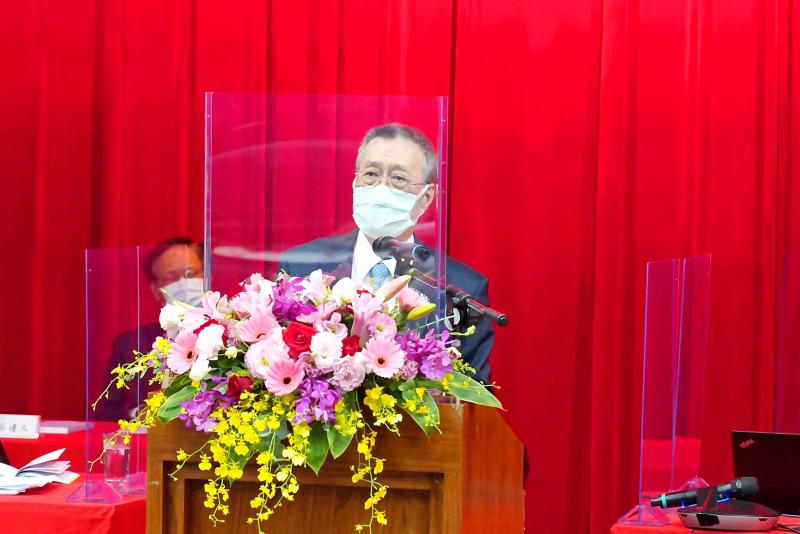Nanya Technology Corp (南亞科技) has received government grants to build a new NT$300 billion (US$10.17 billion) fab after a nine-month deferral primarily due to red tape, as well as shortages of labor and raw materials.
The chipmaker yesterday sent media an invitation to attend a groundbreaking ceremony for the 12-inch fab on June 23.
Nanya Technology expects the fab, to be built in New Taipei City’s Taishan District (泰山), to start commercial operations in 2025.

Photo courtesy of Nanya Technologies Corp
It had expected the fab to start operations in 2024 with a monthly capacity of 15,000 wafers.
The new factory would help Nanya Technology solve capacity bottlenecks, it said.
The chipmaker expects production this year to be little changed for a second year, after a 35 percent year-on-year expansion in 2020.
With the introduction of more advanced technologies, the new fab would help it broaden its product portfolio and expand its customer base, the company said when it unveiled the plans in April last year.
The firm yesterday said that it plans to ramp up production of its first-generation 10-nanometer process technology in the second half of this year, allowing it to offer an 8-gigabyte DDR4 DRAM, among other memory chips.
A second chip, a DDR5 DRAM, is entering pilot production using 10-nanometer technology, Nanya Technology chairman Wu Chia-chau (吳嘉昭) told the company’s annual shareholders’ meeting yesterday.
The 10-nanometer chips are expected to account for 10 percent of total output by the end of this year at the earliest, it said.
The company currently uses mostly 20-nanometer technology to make DRAM chips.
Cloud-based data centers are leading the uptrend in DRAM chip demand, while rising 5G smartphone penetration is also boosting consumption, Wu said, adding that commercial and gaming notebooks are also growth drivers.
However, rising inflation worldwide, geopolitical tensions and supply constraints for key components are dampening demand for consumer laptops and handsets, he added.
The firm’s shareholders at the meeting approved a cash dividend of NT$3.7 per common share, which represents about a 50 percent payout ratio compared with last year’s earnings per share of NT$7.4.

Vincent Wei led fellow Singaporean farmers around an empty Malaysian plot, laying out plans for a greenhouse and rows of leafy vegetables. What he pitched was not just space for crops, but a lifeline for growers struggling to make ends meet in a city-state with high prices and little vacant land. The future agriculture hub is part of a joint special economic zone launched last year by the two neighbors, expected to cost US$123 million and produce 10,000 tonnes of fresh produce annually. It is attracting Singaporean farmers with promises of cheaper land, labor and energy just over the border.

US actor Matthew McConaughey has filed recordings of his image and voice with US patent authorities to protect them from unauthorized usage by artificial intelligence (AI) platforms, a representative said earlier this week. Several video clips and audio recordings were registered by the commercial arm of the Just Keep Livin’ Foundation, a non-profit created by the Oscar-winning actor and his wife, Camila, according to the US Patent and Trademark Office database. Many artists are increasingly concerned about the uncontrolled use of their image via generative AI since the rollout of ChatGPT and other AI-powered tools. Several US states have adopted

KEEPING UP: The acquisition of a cleanroom in Taiwan would enable Micron to increase production in a market where demand continues to outpace supply, a Micron official said Micron Technology Inc has signed a letter of intent to buy a fabrication site in Taiwan from Powerchip Semiconductor Manufacturing Corp (力積電) for US$1.8 billion to expand its production of memory chips. Micron would take control of the P5 site in Miaoli County’s Tongluo Township (銅鑼) and plans to ramp up DRAM production in phases after the transaction closes in the second quarter, the company said in a statement on Saturday. The acquisition includes an existing 12 inch fab cleanroom of 27,871m2 and would further position Micron to address growing global demand for memory solutions, the company said. Micron expects the transaction to

A proposed billionaires’ tax in California has ignited a political uproar in Silicon Valley, with tech titans threatening to leave the state while California Governor Gavin Newsom of the Democratic Party maneuvers to defeat a levy that he fears would lead to an exodus of wealth. A technology mecca, California has more billionaires than any other US state — a few hundred, by some estimates. About half its personal income tax revenue, a financial backbone in the nearly US$350 billion budget, comes from the top 1 percent of earners. A large healthcare union is attempting to place a proposal before